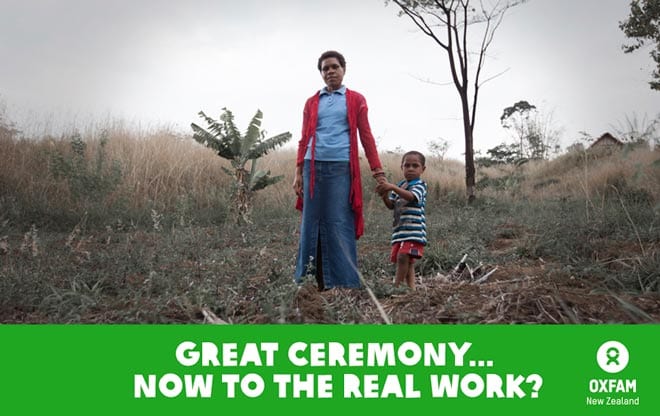As more than 160 countries come together to sign the Paris Climate Change Agreement, taking a critical step towards its implementation, Oxfam calls on governments to continue to confront climate change collectively and turn their commitments into action, while strengthening their current pledges and agreeing to higher finance levels.

As more than 160 countries come together to sign the Paris Climate Change Agreement, taking a critical step towards its implementation, Oxfam calls on governments to continue to confront climate change collectively and turn their commitments into action, while strengthening their current pledges and agreeing to higher finance levels.
“The signing of the Paris agreement today marks a critical step forward towards building a more resilient, low-carbon future. But there is still much unfinished business left from Paris on adapting to the dangerous impacts of climate change” said Oxfam International Executive Director Winnie Byanyima. “If all of today’s public climate adaptation finance were to be divided among the world’s 1.5 billion smallholder farmers in developing counties, they would get around $3 each a year to cope with climate change.”
Countries need to urgently ratchet up their ambition towards climate action as the provisions in the Paris agreement, which takes effect in 2020, are not enough to avoid a pathway towards a 3°C world and does not ensure the provision of adequate funding to ensure millions of vulnerable people can prepare for and respond to increasing climate chaos. Climate adaptation costs will hit up over $500 billion per year by 2050, even if global temperatures are limited to 2°C.
Oxfam estimates approximately 60 million people will face hunger, disease and water shortages this year because of record global temperatures, droughts and erratic rains in 2014 and 2015, compounded by the development of one of the most powerful El Niños on record.
Increasing climate chaos, like El Niños and Super El Niños, could pose a serious threat to the stability of the global food system and increase humanitarian emergencies at a time when resources and capacity are already under enormous strain.
“The El Niño food crisis shows what happens when we fail to invest adequately in preventative measures and in building the resilience of those most vulnerable,” continued Byanyima. “Countries need to step up to the plate and fulfill their promise to significantly increase adaptation finance commitments by COP22 in Marrakesh.”
More members of the private sector also need to scale up pledges to decrease their carbon footprint and publicly champion a fair and ambitious deal. While some companies made climate policy commitments around COP21, it’s crucial more raise their climate ambition and continue to pressure governments to act.
“The private sector is responsible for a very significant part of the world’s carbon emissions. Companies need to work with their suppliers to change practices, and adopt business models that ensure a low carbon economy and build resilience in the supply-chain,” said Byanyima.





